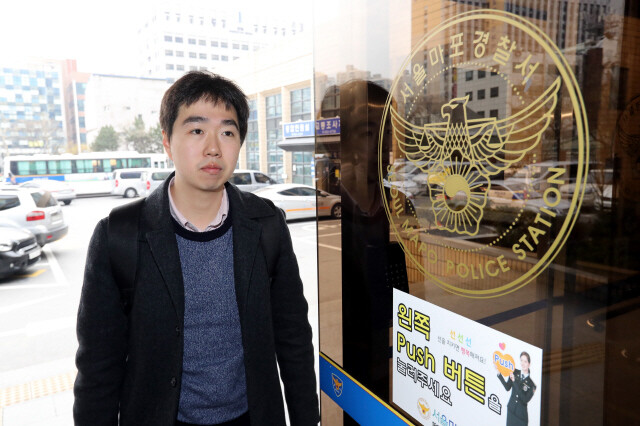hankyoreh
Links to other country sites 다른 나라 사이트 링크
[Editorial] The NIS isn’t investigating, but collecting data from mass surveillance

The National Intelligence Service (NIS), prosecutors, and police have really covered a wide range of targets in their communications surveillance. Seeing the results gathered by the Hankyoreh on communications data provided for its own reporters, opposition party officials, and Korean Confederation of Trade Unions (KCTU) staffers is enough to leave us shocked and terrified. People who have nothing at all in common - let alone anything to talk on the phone about - had their data pulled en masse on the very same day. We can only wonder what the purpose of this personal information dragnet was.
It’s hard to believe this kind of indiscriminate gathering of data was for investigation reasons. The Hankyoreh‘s own investigation found that on Jan. 7, the NIS requested communications information on 28 people in six consecutively numbered documents. The list included six Hankyoreh reporters, 19 KCTU staffers, four opposition party officials, and the family member of a victim in the Apr. 2014 Sewol sinking. For other people, no information was yet available on whether communications data were provided, and with some documents almost certainly remaining to be checked, it’s possible that even more information was given. The NIS claims it checked up on people whose telephone numbers came up as having been in contact with the subjects of an internal investigation into National Security Law violations. But nothing in the duties, daily routines, or relationships of the people whose data were searched offers any kind of common threads connecting them either publicly or personally with specific investigation subjects. The fact that their personal information was provided all at once suggests it may have been intended less for investigative purposes than as sweeping surveillance of groups that have been critical of the administration.
There’s more to support that theory. Prosecutors and police checked up on communications data for editorial executives and writers at the Hankyoreh who never go out to cover stories and who have no reason to talk to sources. If the targets are people who don’t know anyone who is under investigation, the only possible explanation is surveillance. The same documents on the same date had prosecutors pulling information for reporters who separately cover the ruling and opposition parties and whose sources don‘t overlap. At this point, we have to wonder if they weren’t just poking into the entire communications base station near the National Assembly. Right around the same time that controversies were swirling over state history textbook issuance, the Nuri curriculum, and labor market reorganization, the reporters covering these areas had their communications data provided. It’s common sense to question whether this was a case of monitoring and surveillance of a news outlet that was helping to shape critical opinion toward administration policies. The same can be said for the decision to pull data for opposition lawmakers and party officials.
No one would have known about any of this, had the people in question not inquired as to whether their data had been passed along. To date, the NIS has been snatching up unlimited amounts of communications data from the South Korean public without any warrants, or even after-the-fact notification. It has also used this to gather more private information about people. The Constitution’s warrant requirement and personal information rights have been blithely ignored. Instead, citizens have lived under a totalitarian surveillance system where investigative organizations get to deem an unspecified majority “dangerous” and monitor them to their hearts’ content. We can’t afford to justify this away as “investigation secrecy” or ignore it as “common practice.” We need to find out exactly what this information was collected for and how it was used. We also need to amend the law to put this kind of communications data collection under strict judicial controls.
Please direct questions or comments to [english@hani.co.kr]

Editorial・opinion
![[Column] Season 2 of special prosecutor probe may be coming to Korea soon [Column] Season 2 of special prosecutor probe may be coming to Korea soon](https://flexible.img.hani.co.kr/flexible/normal/500/300/imgdb/original/2024/0426/3317141030699447.jpg) [Column] Season 2 of special prosecutor probe may be coming to Korea soon
[Column] Season 2 of special prosecutor probe may be coming to Korea soon![[Column] Park Geun-hye déjà vu in Yoon Suk-yeol [Column] Park Geun-hye déjà vu in Yoon Suk-yeol](https://flexible.img.hani.co.kr/flexible/normal/500/300/imgdb/original/2024/0424/651713945113788.jpg) [Column] Park Geun-hye déjà vu in Yoon Suk-yeol
[Column] Park Geun-hye déjà vu in Yoon Suk-yeol- [Editorial] New weight of N. Korea’s nuclear threats makes dialogue all the more urgent
- [Guest essay] The real reason Korea’s new right wants to dub Rhee a founding father
- [Column] ‘Choson’: Is it time we start referring to N. Korea in its own terms?
- [Editorial] Japan’s rewriting of history with Korea has gone too far
- [Column] The president’s questionable capacity for dialogue
- [Column] Are chaebol firms just pizza pies for families to divvy up as they please?
- [Column] Has Korea, too, crossed the Rubicon on China?
- [Correspondent’s column] In Japan’s alliance with US, echoes of its past alliances with UK
Most viewed articles
- 1No good, very bad game for Korea puts it out of Olympics for first time since 1988
- 2Division commander ordered troops to enter raging flood waters before Marine died, survivor says
- 3Korea’s 1.3% growth in Q1 signals ‘textbook’ return to growth, says government
- 4Will NewJeans end up collateral damage in internal feud at K-pop juggernaut Hybe?
- 5[Column] Season 2 of special prosecutor probe may be coming to Korea soon
- 6[Editorial] Korea’s surprise Q1 growth requires objective assessment, not blind fanfare
- 7[Column] ‘Choson’: Is it time we start referring to N. Korea in its own terms?
- 8‘We must say no’: Seoul defense chief on Korean, USFK involvement in hypothetical Taiwan crisis
- 9Korea sees more deaths than births for 52nd consecutive month in February
- 10Is N. Korea threatening to test nukes in response to possible new US-led sanctions body?